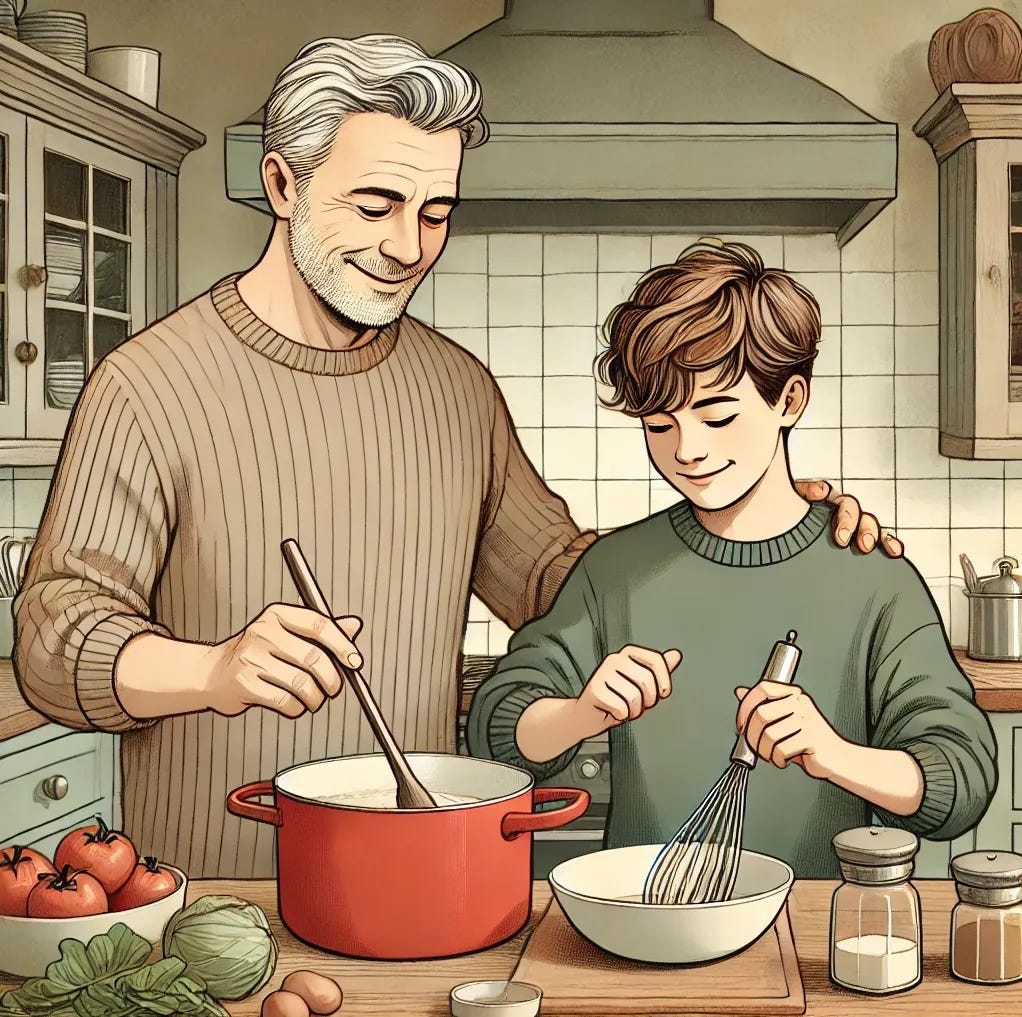I recently spoke with a dad who felt he and his teenage daughter weren’t as close as they used to be. It struck a chord with me, because I’ve been there myself—navigating the uncertainty of where I stand when my child’s world suddenly expands beyond my once all-important role. And while his challenges centred on the teen years, I find these lessons apply to any dad—whether your child is two, twelve, or twenty, and whether you’re bonding over new music with a teenage daughter or questing to save the day in a Super Mario 3D World marathon with your son. After all, fatherhood is a lifelong journey, and the way we relate to our children is always evolving.
From Protector to Supporter (and Collaborator)
When our children are small, we’re front and centre—tying shoelaces, scaring away the monsters under the bed, and making sure they’re safe from every bump and bruise. We’re their protectors, and it can feel deeply rewarding. But one day, you might look up and realise that your child is more independent than ever. They’re off to secondary school, juggling activities you can hardly keep track of, and sharing inside jokes with friends you’ve never met.
That shift from being an ever-present caretaker to a supportive collaborator can be jarring. Yet it’s also an opportunity to reshape how we connect with our children. By embracing their newfound independence—and inviting them to collaborate with us rather than simply obey—we encourage fresh ways of relating that can be every bit as meaningful as the early years.
A Dad’s Story (and My Own)
The dad I mentioned was wrestling with the sudden emotional distance between him and his daughter. One moment, she’d share every detail of her day; the next, she’d barely look up from her phone. Meanwhile, I’ve faced a version of this dynamic in my own home: for my teenage daughter and me, cooking remains our go-to connection. Every New Year’s Eve, we whip up a homemade curry. The conversation meanders between silly banter, eye-rolling, and plenty of laughter, but by the end, we’ve shared a meal (usually decent!) and kept our bond alive.
Last Christmas, we even made a chocolate orange cheesecake that turned out surprisingly well—though the real win was finding common ground in the kitchen. And when it comes to my son, we’re on a joint quest to conquer the levels of Super Mario 3D World. He loves teaching me all the tricks and secrets, and I love seeing him light up when we finally beat a tough level together. In both cases, these moments remind me that while our relationships evolve, we can still find new ways to connect—through cooking, gaming, shared jokes, or any activity that brings us together.
Navigating the Rollercoaster of Parenting
If you’ve got a teenager at home—or if you remember your own teen years—you know it can feel like riding an emotional rollercoaster. One day, your child is your biggest fan, telling you stories and bouncing around ideas; the next, they’re off in their own universe and you’re left wondering what just happened.
Yet this stage is perfectly natural. They’re pushing for independence, figuring out social circles, and making sense of a world that feels bigger by the minute. It’s rarely about rejecting you personally—more about them stretching their wings. If we give them space to explore while letting them know we’re here, our relationship can grow in surprising, rewarding ways.
Small Moments, Big Magic
We often hear that small is where the magic is, and I’ve found that to be absolutely true. Big, showy gestures can be fun but aren’t sustainable in everyday life. It’s the spontaneous milkshake run, the random five-minute dance session in the living room, or the quick high-five after beating a tricky Mario level that truly weaves closeness into our day-to-day.
Consistent, bite-sized efforts—like sending a thoughtful text, asking a creative question at dinner, or offering a warm hug if your child’s comfortable with it—can stitch our hearts together in the long run. Even if your child seems “too old” or “too cool,” these little moments often mean more than we realise. And just as importantly, they remind us that we’re not only parents for our children, we’re also partners with them in life’s everyday adventures.
Truly Knowing Their World
If you’re sensing some distance, one place to start is by checking how much you actually know about your child’s world right now. Who are their closest friends? Which Minecraft realm or Mario kingdom are they exploring? What social media trends make them giggle or roll their eyes?
By showing sincere curiosity—even (especially!) if their interests aren’t yours—you’re telling them: I see you, and I want to understand you. That acknowledgement alone can soften the edges of adolescence and open doors you might have thought were sealed shut.
Supporting Their Choices (While You Grow, Too)
As dads, we often have opinions about our children’s decisions. Maybe we worry about which subjects they pick in school or the career path they lean towards. Yet the older they get, the more these choices are theirs to make. We can offer a guiding hand, share our experiences, and help them unpack the pros and cons—but ultimately, trusting them to learn from their choices can deepen mutual respect.
Don’t forget: we are growing too. When our children show us the latest gaming hack or that pop song we never thought we’d like, we’re learning to adapt, expand our horizons, and even find new joys. Embracing our own growth keeps us humble and shows our kids that changing and learning are lifelong adventures.
Reconciliation Gestures: Connecting Without Expectation
No relationship is free from hiccups—whether you’re parenting a toddler, a teen, or someone in between. Sometimes you’ll argue, sometimes you’ll feel worlds apart, and sometimes you’ll just drift. In NVR (Non Violent Resistance), the concept of “reconciliation gestures” offers a simple way to sustain connection without demanding anything in return. These gestures aren’t about “rewarding” your child’s behaviour; they’re about proving you care, regardless of conflict.
They serve as evidence that you’re still an important presence in your child’s life, and that your love isn’t contingent on them meeting certain standards. The key is to offer them freely—without strings attached. Here are a few ideas you won’t find repeated elsewhere:
A Handwritten Note
Slide a genuine, encouraging message into their backpack or under their game controller. You’re not fishing for a response—just reminding them you’re thinking of them.A Surprise Token
If you see a small souvenir or goofy keyring that references a shared inside joke, drop it on their desk with a “This made me think of you.”Acts of Service
Quietly tidy something you know bugs them or fix that squeaky door they’ve complained about. It’s a subtle way of saying, “I’m tuned in to what matters to you.”Out-of-the-Blue Encouragement
Send a short text that says, “I believe in you!” out of nowhere—no test results or achievements needed.Shared Memory Memento
Print a photo of a fantastic day out—maybe the time you beat Bowser as a team—and leave it near the TV or kitchen table for them to stumble upon.
Crucially, these aren’t transactional gestures or attempts to “fix” anything. They’re purely expressions of care, helping your child realise you’re a constant they can return to, even if they keep their distance for a while.
A Gentle Reminder About Self-Care
In the midst of guiding and supporting our kids, it’s easy for us dads to put our own well-being on the back burner. Yet taking five minutes for a quiet cup of tea, going for a short walk, or reaching out to a friend for a chat can refill our own emotional reserves. After all, if we’re running on empty, we’ll have less to give to the people we love most.
Reflecting on Your Approach
Parenting rarely follows a straight path; it’s a winding, sometimes looping adventure that tests our patience, adaptability, and sense of humour. Here are a few questions you might keep in mind:
Do I respect their need for space?
Sometimes a gentle retreat can encourage them to move closer on their own terms.How often do I simply listen rather than offer solutions?
Teens, especially, often crave a judgement-free sounding board more than a “fix.”Where can I introduce small, regular touchpoints of connection?
Even a quick high-five after conquering a challenging Mario level fosters warmth.Am I open to learning from my child’s interests and passions?
Letting them guide you is a powerful way to show respect.What silent expectations might prevent them from being fully honest with me?
Are they worried about letting you down, or do they fear judgement?
A Glimpse of Hope
Yes, the teenage years—and sometimes the pre-teen ones—can feel stormy. It’s not unusual for children to pivot from “Let’s hang out!” to “I need my space” in the blink of an eye. But these shifts are also signs of development, exploration, and growth. Meanwhile, we can learn with them and from them, evolving into guides and collaborators rather than all-powerful fixers.
Whether you’re cheering on your toddler as they learn to tie their shoes or strategising the next step in a Mario 3D World quest with your son, these moments of connection weave a tapestry of trust and empathy that can last a lifetime. And through it all, we remind them: as they grow, they’re never really growing away from us, but always growing with us.
Let’s Keep the Conversation Going
All these ideas become richer when we learn from and support one another. So, I’d love to know: What do you do with your children to strengthen that all-important connection? Is there something you might try differently after reading this? Or maybe there’s a better way to approach any of these ideas that resonates with you. Please share—I’d genuinely love to hear your thoughts and experiences.






Hey, I'm a dad of four boys - I connect a lot with what you've written. Particularly, this quote on connecting without expectations really resonates, "...your love isn’t contingent on them meeting certain standards." Personally and professionally, I'm a psychologist who works a lot with dads, this is something I focus on. I think it is easy to get stuck in a cycle where we develop quid pro quo expectations with our kids. And I get it, life is busy and as parents we have so many commitments. With that said, I agree that finding the time to connect and be present with your kiddo without any expectations is really important. I think there's a ton of barriers to this, too, as a result of our busy and often overwhelming lives!